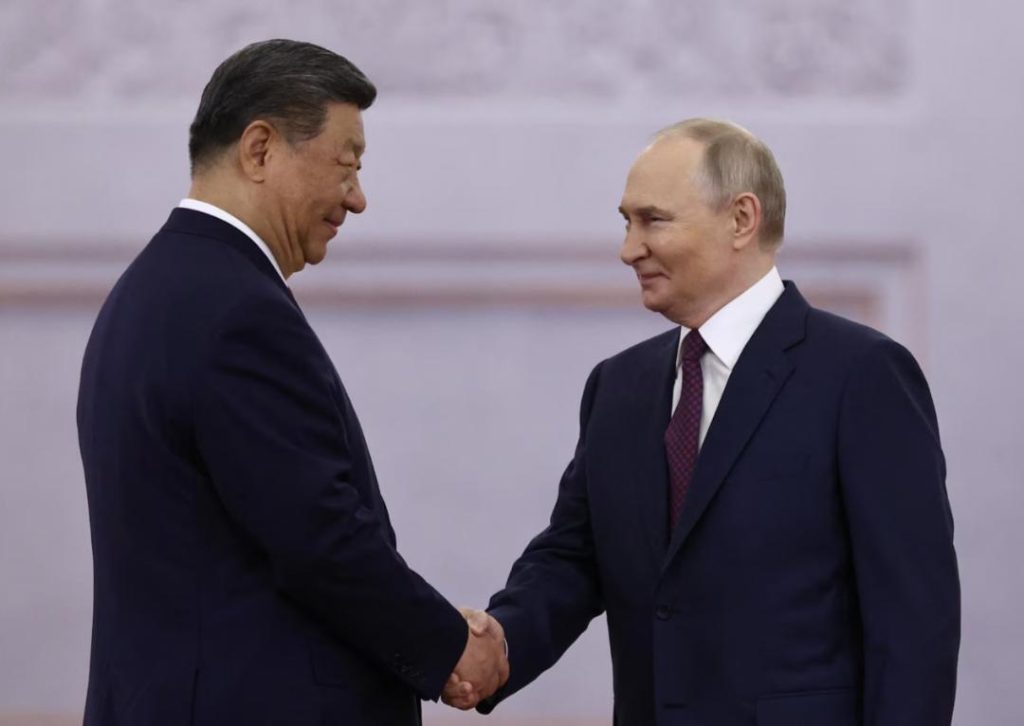
Russia & China Stand United Against Neo-Nazism: Vladimir Putin
In a powerful display of international cooperation, Russian President Vladimir Putin and Chinese President Xi Jinping have reaffirmed their commitment to combating neo-Nazism and extremism. The two leaders gathered at the Kremlin to mark the 80th anniversary of the Soviet Union’s victory over Adolf Hitler in World War II, a momentous occasion that holds significant symbolism in the fight against fascism and totalitarian ideologies.
Putin took the opportunity to express his gratitude to Xi for joining him in commemorating this important milestone, emphasizing the enduring importance of the Allied victory. “The victory over fascism, achieved at the cost of enormous sacrifices, is of lasting significance,” Putin said, according to a statement released by the Kremlin. “It is a testament to the unity and strength of the anti-fascist coalition, which saved humanity from the abyss of war and destruction.”
The Russian President’s words carry significant weight, given the country’s own experiences with Nazi occupation during World War II. The Soviet Union suffered an estimated 27 million casualties, including both military and civilian losses, as a result of the German invasion in 1941. Putin’s emphasis on the importance of the Allied victory serves as a reminder of the devastating consequences of fascist ideologies and the need for continued vigilance in the face of modern-day neo-Nazism.
Xi Jinping, for his part, echoed Putin’s sentiments, emphasizing the importance of international cooperation in the fight against extremism. “The victory over fascism is a powerful lesson for the world,” Xi said. “It reminds us that only through unity, cooperation, and the pursuit of peaceful development can we overcome the challenges we face.”
The meeting between Putin and Xi sends a strong message of solidarity against neo-Nazism and extremism, particularly in the face of growing concerns about the rise of far-right ideologies in Europe and beyond. Russia and China have long been critical of Western powers’ handling of the Ukrainian crisis, and have accused the United States and its allies of pursuing a neo-Nazi agenda in Ukraine.
In recent years, both countries have taken steps to counter what they perceive as a growing threat from neo-Nazism. Russia has implemented a range of measures to combat extremism, including the creation of a new federal agency to oversee efforts to prevent terrorism and extremism. China, meanwhile, has launched a nationwide campaign to “purify” the internet of extremist content and has increased its efforts to monitor and suppress online activity deemed to be promoting terrorism or extremism.
The meeting between Putin and Xi also underscores the growing importance of the Russia-China strategic partnership. The two countries have been expanding their economic and military cooperation in recent years, with a particular focus on energy and infrastructure projects. Russia has become increasingly dependent on China as a major export market, and the two countries have been working together to develop new energy projects in Siberia and the Russian Far East.
In the context of the global fight against neo-Nazism and extremism, the Russia-China partnership holds significant potential. By working together, the two countries can leverage their shared experiences and expertise to develop more effective strategies for combating extremism and promoting international cooperation.
The meeting between Putin and Xi also serves as a reminder of the importance of international cooperation in the face of global challenges. As the world grapples with the rise of far-right ideologies and the growing threat of terrorism, it is more important than ever that nations work together to promote peace, stability, and understanding.
In conclusion, the meeting between Putin and Xi is a powerful symbol of international cooperation in the fight against neo-Nazism and extremism. As the two leaders reaffirm their commitment to combating these ideologies, they send a strong message of solidarity to the world. The Russia-China partnership holds significant potential for promoting international cooperation and developing more effective strategies for combating extremism. As the world looks to the future, it is clear that the fight against neo-Nazism and extremism will be a top priority for nations around the globe.
Source:
https://www.reuters.com/world/europe/putin-greets-chinas-xi-kremlin-2025-05-08/



